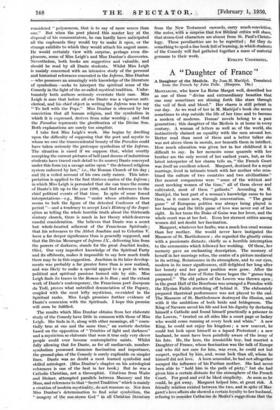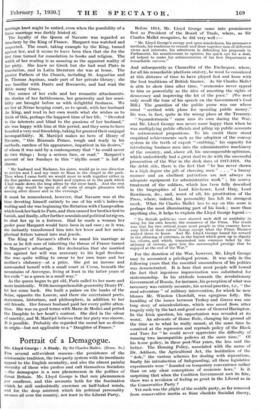A " Daughter of France "
A Daughter of the Medias. By Jean H. MariejoL Translated from the French by John Peile. (Harpers. 16s.) MONTAIGNE, who knew La Heine Margot well, described her as one of those " divine and extraordinary beauties that one may sometimes see shining forth like stars through the veil of flesh and blood." Her charm is still potent in our day. As we read of her in M. Mariejol's book she seems sometimes to step outside the life of her time and to become a modern of moderns. Dumas' novels belong to a past generation; this daughter of the Medicis is at home in every century. A woman of letters as well as of the world, she instinctively claimed an equality with the men around her. Better read than most of them and a better talker she was not above them in morals, nor beneath them- in intellect. How much education was given her in her childhood it is difficult to say. In her memoirs some quarrels with her brother are the only record of her earliest years, but, as the latest interpreter of her charm tells us, " the French Court was itself an excellent school. Margaret, destined for a royal marriage, lived in intimate touch with her mother who com- bined the culture of two countries and two civilizations." Her nearest companions were " some of the wittiest and most mocking women of the time," all of them clever and cultivated, most of them " gallants." According to M. Mariejol, the best part of a woman's knowledge came to her ' then, as it comes now, through conversation. " The great game " of European politics was always being played in her hearing and the little game of love was never out of her sight. In her teens the Duke of Guise was her lover, and the whole court was at her feet. Even her sternest critics among women did not doubt her fascination.
Margaret, whatever her faults, was a much less cruel woman than her mother. She would never have instigated the Massacre of St. Bartholomew ; she regarded the ghastly crime with a passionate distaste, chiefly as a horrible interruption to the ceremonies which followed her wedding. Of these, her memory gave an enchanting description. The memory of herself in her marriage robes, the centre of a picture mediaeval in its setting, Renaissance in its atmosphere, and to our eyes, modern in its inner significances, still delighted her long after her beauty and her great position were gone. After the ceremony at the door of Notre Dame began the " games long prepared." The old palace of the Louvre was thrown open ; in the great Hall of the Bourbons was arranged a Paradise with the Elysian Fields stretching oft behind it. The elaborately prepared theatrical performance was not played to the end. The Massacre of St. Bartholomew destroyed the illusion, and with it the ambitions of both bride and bridegroom. The King of Navarre saved his life and lost his dignity by declaring himself a Catholic and found himself practically a prisoner in the Louvre, " treated on all sides like a court page or lackey who would come running at every beck and whim." A new King, he could not enjoy his kingdom ; a new convert, he could but look upon himself as a lapsed Protestant ; a new husband, he must have been painfully aware of the irony of his fate. He, the hero, the irresistible boy, had married a Daughter of France, whose fascination was the talk of Europe and who did not care for him, was even, he could not but suspect, repelled by him, and, worse luck than all, whom he himself did not love. A born sensualist, he had not altogether escaped the influence of his Puritan mother. She had never been able to " hold him in the path of piety," but she had given him a certain distaste for the atmosphere of the French Court. For good and evil he liked simplicity. As soon as he could, he got away. Margaret helped him, at great risk. A friendly relation existed between the two, and in spite of Mar- garet's love affairs she showed a certain loyalty to her husband, refusing to consider Catharine de Medici's suggestions that the
marriage knot might be untied, even when the possibility of a Guise marriage was darkly hinted at.
The loyalty of the Queen of Navarre was regarded as treachery by the King of France. Margaret was watched and
suspected. The court, taking example by the King, turned
against her, and it seems to have been then that she for the first time turned for consolation to books and religion. The
width of her reading is as amazing as the apparent reality of her piety. She knew no Greek but she had read Plato in translation, and in Latin literature she was at home. The greater Fathers of the Church, including St. Augustine and
St. Thomas Aquinas, made part of her private library; she was familiar with Dante and Boccaccio, and had read the Bible many times.
The scenes of her exile and her romantic attachments, the stories of her faithlessness, her generosity and her sensi-
bility are brought before us with delightful freshness. We see her at Norse keeping court, so to speak, with her husband the King, and read in her own words what she wishes us to think of this, perhaps the happiest time of her life. " Devoted to the interests and blind to the passions of her husband," she was happy with him at this period, and they seem to have founded a very real friendship, taking for granted their conjugal incompatibility. M. Mariejol makes no hero of Henry of Navarre, " this Bearnais Prince, rough and ready in his methods, careless of his appearance, impatient in his desires," of whom it was said by a contemporary that " he could never do two things ; keep a serious face, or read." Margaret's account of her Sundays in this " idyllic court " is full of charm.
" My husband and Madame, his sister, would go in one direction to service and I and my train to Mass in the chapel in the park. Then when I came forth we would meet to walk together either in the fine garden among the laurel and cypress or in the park which I had made down the long alleys by the river bank. And the rest of the day would be spent in all sorts of simple pleasures with dancing after dinner and in the evenings."
It must be remembered, however, that Navarre was at the time devoting himself entirely to one of his wife's ladies-in- waiting and she was beginning the flirtation with Champvallon
which took her back to Paris, and then caused her brother first to banish, and finally, after further scandals and political intrigues, to shut her up in a fortress. Had he made a woman her gaoler poor Margaret would have been in sad case ; as it was, she instantly transformed him into her lover and her meta- phorical fetters turned into real jewels.
The King of Navarre's efforts to annul his marriage as soon as he felt sure of inheriting the throne of France turned to Margaret's advantage. Her declaration that she married him against her will was necessary to his legal freedom. She was .quite willing to swear to her own tears and her mother's obduracy—at a price. She got an income and surrounded herself with a small court at Usson, beneath the mountains of Auvergne, living at least in the latter years of her exile " as a queen in a small way."
As the queen began to get old, Paris called to her more and more insistently. With incomprehensible generogity Henry IV.
let her come back. She built a palace on the banks of the
Seine, opposite the Louvre, and there she entertained poets, statesmen, historians, and philosophers, in addition to her old friends. Her former husband paid her every polite atten- tion. She was on good terms with Marie de Medici and petted the Dauphin to her heart's content. She died in the odour of sanctity, and M. Mariejol believes that her piety was sincere.
It is possible. Probably she regarded the moral law as divine in origin—but not applicable to a " Daughter of France."







































 Previous page
Previous page